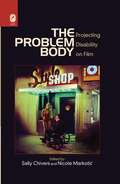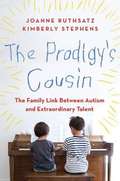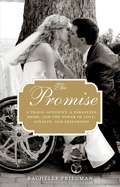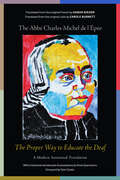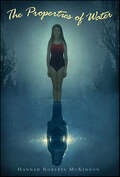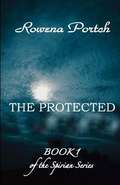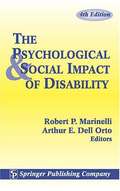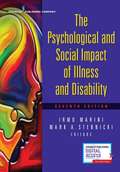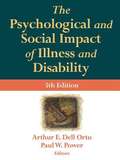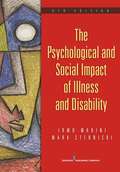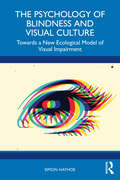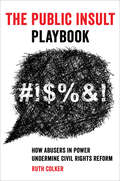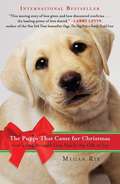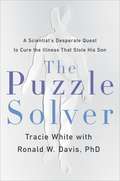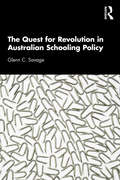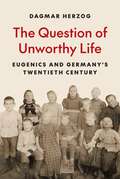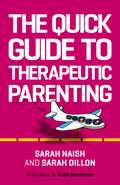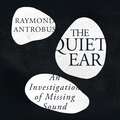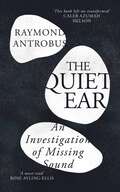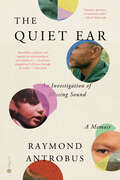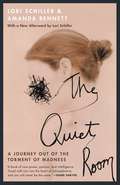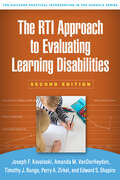- Table View
- List View
The Prison of My Mind
by Barbara Field BenzigerIn this memoir of psychiatric illness, the author describes two hospitalizations and her eventual restoration to mental health. In the first hospital she receives indifferent and even abusive treatment. In the second she has the good fortune to be assigned to a wise and compassionate psychiatrist who helps her explore her inner conflicts and find peace. Benziger writes eloquently of the terror of severe panic attacks when the world seems to be collapsing around her.
The Problem Body: Projecting Disability on Film
by Sally Chivers Nicole MarkoticEditors Sally Chivers and Nicole Markotic bring together the work of eleven of the best disability scholars from the U.S., the U.K., Canada, and South Korea to explore a new approach to the study of film by concentrating on cinematic representations of what they term "the problem body." The book is a much-needed exploration of the projection of disability on film combined with a much-needed rethinking of hierarchies of difference. The editors turned to the existing corpus of disability theory with its impressive insights about the social and cultural mediation of disabled bodies. They then sought, from scholars at every stage of their careers, new ideas about how disabled bodies coexist with a range of other bodies (gendered, queered, racialized, classed, etc.). To call into question why certain bodies invite the label "problem" more frequently than other bodies, the contributors draw on scholarship from feminist, race, queer, cultural studies, disability, and film studies arenas. In Chivers and Markotic's introduction, they draw on disability theory and a range of cinematic examples to explain the term "problem body" in relation to its projection. In explorations of film noir, illness narratives, classical Hollywood film, and French film, the essays reveal the "problem body" as a multiplication of lived circumstances constructed both physically and socially.
The Prodigy's Cousin
by Joanne Ruthsatz Kimberly StephensWe all know the autistic genius stereotypes. The absentminded professor with untied shoelaces. The geeky Silicon Valley programmer who writes bulletproof code but can't get a date. But there is another set of (tiny) geniuses whom you would never add to those ranks--child prodigies. We mostly know them as the chatty and charming tykes who liven up daytime TV with violin solos and engaging banter. These kids aren't autistic, and there has never been any kind of scientific connection between autism and prodigy. Until now. Over the course of her career, psychologist Joanne Ruthsatz has quietly assembled the largest-ever research sample of these children. Their accomplishments are epic. One could reproduce radio tunes by ear on a toy guitar at two years old. Another was a thirteen-year-old cooking sensation. And what Ruthsatz's investigation revealed is nothing short of astonishing. Though the prodigies aren't autistic, many have autistic family members. Each prodigy has an extraordinary memory and a keen eye for detail--well-known but often-overlooked strengths associated with autism. Ruthsatz and her daughter and coauthor, Kimberly Stephens, now propose a startling possibility: What if the abilities of child prodigies stem from a genetic link with autism? And could prodigies-- children who have many of the strengths of autism but few of the challenges--be the key to a long-awaited autism breakthrough? In The Prodigy's Cousin, Ruthsatz and Stephens narrate the poignant stories of the children they have studied, including that of a two-year-old who loved to spell words like "algorithm" and "confederation," a six-year-old painter who churned out masterpieces faster than her parents could hang them, and a typically developing thirteen-year-old who smacked his head against a church floor and woke up a music prodigy. This inspiring tale of extraordinary children, indomitable parents, and a researcher's unorthodox hunch is essential reading for anyone interested in the brain and human potential. Ruthsatz and Stephens take us from the prodigies' homes to the depths of the autism archives to the cutting edge of genetics research, all while upending our understanding of what makes exceptional talent possible.From the Hardcover edition.
The Profession of Orientation and Mobility in the 1980s: The AFB Competency Study
by Mark M. Uslan Everett W. Hill Alec F. PeckThis book is a report of two national studies to compile descriptive statistical information about the demographic trends that will influence the future of the O&M profession--one conducted in 1983 and the other in 1985.
The Promise: A Tragic Accident, a Paralyzed Bride, and the Power of Love, Loyalty, and Friendship
by Rachelle FriedmanRachelle Friedman describes her life before and after her accident which leaves her paralyzed. In spite of the serious nature of her accident, she is able to form a new life. In this true story, she shows how the love of her friends, family, and inner strength helped her to recover from the emotional trauma and help others.
The Proper Way to Educate the Deaf: A Modern Annotated Translation
by The Abbé de l’EpéeThis volume presents the first complete English translation of the Abbé de l’Épée’s seminal work describing his methodology for educating deaf children. Originally published in French in 1798, this modern annotated edition offers readers a translation that is documentary in scope and that reflects historic attitudes toward deaf people and deaf education while maintaining the conventions of contemporary English. De l’Épée provides an anecdotal account of his methods and philosophy for educating deaf children using a sign system based on the French Sign Language of the era but adapted to visually represent the linguistic features of spoken and written French. His work laid the foundation for the use of the “manual method,” or sign language, in deaf education. One section of the text, originally published in Latin, outlines the intellectual clash between de l’Épée and Samuel Heinicke, an early proponent of oral education who contested the use of sign language. De l’Épée’s text holds significant cultural and historical value for the fields of deaf studies and deaf education. This English language translation reveals de l’Épée’s own story of how he came to be known as the “father of the deaf” and is enriched by scholarly contributions that provide essential historical context and a framework for modern understanding.
The Properties of Water
by Hannah Roberts McKinnonWhen Lace's older sister, Marni, falls victim to a summer swimming accident, it paralyzes Lace in time. For Lace, there is only a before--can there be an after? But as the summer surges on, she learns that she must return to the water, the very thing that tore her family apart. This beautifully crafted novel explores the boundaries of family and friendship, the greatest griefs that knock us down, and the smallest kindnesses that guide us to safe harbors.
The Protected: Book 1 of the Spirian Series
by Rowena PortchThis is book one of three in the Spirian series. It tells the story of Skye Taylor, a blind massage therapist who soon learns that she is a Spirian (a gifted soul) who has the ability to heal people's injuries. She meets, Khalen, a Spirian man, whose gifts are both intriguing and deadly. Together, they redefine the future of their race and threaten the existence of their evil rivals, the Shadows.
The Psychological And Social Impact Of Disability
by Arthur E. Dell Orto Robert P. MarinelliMarinelli and Dell Orto continue the premise of their earlier editions of this widely adopted text and present a realistic perspective on disability. Carefully selected articles and personal narratives capture the unique aspects of the psychological and social effects of disability. Formatted to include thought-provoking study questions and disability awareness exercises, this text is recommended for students in rehabilitation counseling and physical therapy education programs, as well as professionals in rehabilitation, psychology, and social work.
The Psychological and Social Impact of Illness and Disability
by Irmo Marini Mark A. StebnickiNow in its seventh edition, this bestselling classic continues to be the most comprehensive and diverse text available on the psychosocial aspects of illness and disability. It is substantially revised to reflect the growing disparity between the haves and the have-nots and incorporates social justice issues throughout the text. In addition to new and updated information integrated throughout the book, the seventh edition features two new chapters addressing social justice in regards to depression and disability, and the psychosocial aspects of grief, death, and dying. Additionally, the text now includes an Instructor’s Manual and PowerPoint slides. Combining a mix of seminal work from rehabilitation counseling legends with current theoretical and treatment approaches, the book provides a practical, real-life perspective and offers broad and inclusive coverage of the day-to-day challenges of working with a diverse and marginalized population. Additionally, the text analyzes barriers to enabling patients with disabilities and improving their quality of life. Chapter objectives, review questions, and personal narratives in each chapter facilitate in-depth learning.
The Psychological and Social Impact of Illness and Disability (5th Edition)
by Paul W. Power Arthur E. Dell OrtoThis collection, which defines disability very broadly to include post-traumatic stress and normal aging, includes classic articles and discussion questions as well as new material on illness. With a few exceptions it concentrates on the needs of caregivers and those who seek to rehabilitate people with disabilities. Therefore articles cover such issues as definitions of disability and current or past models, shifts in expectations of care demanded by the disabled, perceptions of stages of adjustment to disability, differences in the experience of men and women, the difficulties in discerning the quality of life from outside disability, sexuality, methods of intervention and treatment to promote acceptance o a disability, family issues surrounding life and death, special resources such as assistive technology and spirituality, new applications of eugenics and euthanasia, and "quality aging." Includes exercises and narratives about disability, primarily by caregivers.
The Psychological and Social Impact of Illness and Disability (Sixth Edition)
by Irmo Marini Mark StebnickiExamines current thought and treatment approaches in working with individuals with disabilities. Abundant and insightful narratives by disabled individuals offer a bridge between theory and practice for students in rehabilitation psychology and counselling courses.
The Psychology of Blindness and Visual Culture: Towards a New Ecological Model of Visual Impairment
by Simon HayhoeThe Psychology of Blindness and Visual Culture: Towards a New Ecological Model of Visual Impairment advances the debate regarding the inclusion and wellbeing of people with visual impairment (PVI) through looking at the psychological nature of visual culture and its effects on the lived experience. It explores whether it is possible to increase access to visual culture for PVI through language, alternative sensory data or contemporary communication media, and in so doing, questions whether or not communication and culture are intrinsically visual.Occupying a unique field of study by focusing on the understanding of visual culture and visual communication by PVI in real-world settings, this empirical book examines the difference between the understanding of visual culture and visual communication by PVI who acquire their visual impairments late in life and PVI who acquire their visual impairments early in life. Understanding these concepts not only helps us to understand how PVI feel socially included in visual culture, but also how culture and artifacts are conceptualized verbally, culturally and through the senses.It is compelling reading for advanced students of psychology and philosophy, and those studying learning in cultural settings, and in museum studies, computer science, disability studies, education and fine art management.
The Public Insult Playbook: How Abusers in Power Undermine Civil Rights Reform
by Ruth ColkerWhen they go low, we learn: an examination of mudslinging in contemporary American politics—and how the left can find its footing to achieve structural reform in this mess. The rules of the public discourse game have changed, and The Public Insult Playbook argues that the political left needs to account for the power of vitriol in crafting their theories for social and political change. With this book, noted constitutional law expert and disability rights advocate Ruth Colker offers insights into how public insults have come to infect contemporary public discourse—a technique not invented by but certainly refined by Donald Trump—and, importantly, highlights lessons learned and tools for fighting back. Public insults act as a headwind and dead weight to structural reform. By showcasing the power of insults across a number of civil rights battlegrounds, The Public Insult Playbook uncovers the structural nature of personal attacks, and offers a blueprint for a legal and political strategy that anticipates the profound but poorly understood damage they can inflict to whole movements. Illustrating how completely the tactic has been adopted and embraced by the American right wing, the book catalogues how public insults have been used against people with disabilities, immigrants, people seeking abortions, individuals who are sexually harassed, members of the LGBTQ community, and, of course, Black Americans. These examples demonstrate both the pervasiveness of the deployment of insults by the political right and the ways in which the left has been caught flat-footed by this tactic. She then uses the Black Lives Matter movement as a case study to consider how to effectively counter these insults and maintain an emphasis on structural reform.
The Puppy That Came for Christmas: And Brought One Family the Gift of Joy
by Megan RixMarley, Oogy, Huck-and now, Traffy, the "forever dog" that changed one couple's life. All Megan Rix ever wanted was a baby. Yet, month after month, Megan's dreams were dashed. Would her life ever feel complete? Megan and her husband, Ian, found a surprising answer when they began training golden retriever pups to become service dogs for people with disabilities. But opening their homes and hearts up to Emma, and then Freddy-only to have each move on after six months-eventually took its own toll. Megan and Ian didn't know if they could continue. Then, one Christmas, little Traffy came along . . . and stayed. An instant U. K. bestseller, The Puppy That Came for Christmas is a heartwarming and inspirational story that will captivate dog lovers everywhere.
The Puzzle Solver: A Scientist's Desperate Quest to Cure the Illness that Stole His Son
by Tracie WhiteA Father, His Son, and an Unrelenting Quest for a CureAt the age of twenty-seven, Whitney Dafoe was forced to give up his life as a photographer who traveled the world. Bit by bit a mysterious illness stole away the pieces of his life: First, it took the strength of his legs, then his voice, and his ability to eat. Finally, even the sound of a footstep in his room became unbearable. The Puzzle Solver follows several years in which he desperately sought answers from specialist after specialist, where at one point his 6'3" frame dropped to 115 lbs. For years, he underwent endless medical tests, but doctors told him there was nothing wrong. Then, finally, a diagnosis: Chronic Fatigue Syndrome, also known as myalgic encephalomyelitis.In the 80s, when an outbreak of people immobilized by an indescribable fatigue were reported near Lake Tahoe, Nevada, doctors were at a loss to explain the symptoms. The condition would alternatively be nicknamed Raggedy Ann Syndrome or the Yuppie Disease, and there was no cure or answers about treatment. They were to remain sick.But there was one answer: Whitney's father, Ron Davis, PhD, a world-class geneticist at Stanford University whose legendary research helped crack the code of DNA, suddenly changed the course of his career in a race against time to cure his son's debilitating condition.In The Puzzle Solver, journalist Tracie White, who first wrote a viral and award-winning piece on Davis and his family in Stanford Medicine, tells his story. In gripping prose, she masterfully takes readers along on this journey with Davis to solve one of the greatest mysteries in medicine. In a piercing investigative narrative, closed doors are opened, and masked truths are exposed as Davis uncovers new proof confirming that Chronic Fatigue Syndrome is a biological disease.At the heart of this book is a moving story that goes far beyond medicine, this is a story about how the power of love -- and science -- can shine light in even the darkest, most hidden, corners of the world.
The Quest for Revolution in Australian Schooling Policy
by Glenn C. SavageThis book seeks to critically examine the impacts of ‘grand designs’ in public policy through a detailed historical analysis of Australian schooling reforms since the ‘education revolution’ agenda was introduced by the federal government in the late 2000s. Combining policy analyses and interviews with senior policy makers and ministerial advisors centrally involved in the reforms, it offers a detailed interpretive analysis of the complexities of policy evolution and assemblage. The book argues that the education revolution sought to impose a new order on Australian schooling by aligning state and territory systems to common policies and processes in areas including curriculum, assessment, funding, reporting and teaching. Using a theory and critique of ‘alignment thinking’ in public policy, Savage shows how the education revolution and subsequent reforms have been underpinned by uncritical faith in the power of nationally aligned data, evidence and standards to improve policies and unite systems around practices ‘proven to work’. The result is a new national policy assemblage that has deeply reshaped the making and doing of schooling policy in the nation, generating complex questions about who is steering the ship of education into the future. The Quest for Revolution in Australian Schooling Policy is a must read for education policy researchers, policy makers, education ministers and school leaders, and will appeal to anyone with an interest in the complex power dynamics that underpin schooling reforms.
The Question of Unworthy Life: Eugenics and Germany’s Twentieth Century
by Dagmar HerzogThe dark history of eugenic thought in Germany from the nineteenth century to today—and the courageous countervoicesBetween 1939 and 1945, Nazi genocide claimed the lives of nearly three hundred thousand people diagnosed with psychiatric illness or cognitive deficiencies. Not until the 1980s would these murders, as well as the coercive sterilizations of some four hundred thousand others classified as &“feeble-minded,&” be officially acknowledged as crimes at all. The Question of Unworthy Life charts this history from its origins in prewar debates about the value of disabled lives to our continuing efforts to unlearn eugenic thinking today.Drawing on a wealth of rare archival evidence, Dagmar Herzog sheds light on how Germany became the only modern state to implement a plan to eradicate cognitive impairment from the entire body politic. She traces how eugenics emerged from the flawed premise that intellectual deficiency was biologically hereditary, and how this crude explanatory framework diverted attention from the actual economic and clinical causes of disability. Herzog describes how the vilification of the disabled was dressed up as the latest science and reveals how Christian leaders and prominent educators were complicit in amplifying and legitimizing Nazi policies.Exposing the driving forces behind the Third Reich&’s first genocide and its persistent legacy today, The Question of Unworthy Life recovers the stories of the unsung advocates for disability rights who challenged the aggressive victimization of the disabled and developed alternative approaches to cognitive impairment based on ideals of equality, mutuality, and human possibility.
The Quick Guide to Therapeutic Parenting: A Visual Introduction (Therapeutic Parenting Books)
by Sarah Naish Sarah DillonTherapeutic parenting is not your usual parenting style. It's a special, specific way to raise kids who have experienced trauma in their past, and requires a lot of commitment and determination - this is about far more than love and care.But where do you start?This book is the ideal first step for anyone who wants to understand how therapeutic parenting works. It offers simple summaries of the key ideas behind it, fully illustrated throughout with informative cartoons and graphics. Over 40 different issues are covered, from dysregulation and fear, to setting boundaries and parenting in the midst of trauma.The perfect introduction for new therapeutic parents, family members, teachers or other adults who need to help support you and your child, this Quick Guide will also be a source of inspiration for more experienced parents.
The Quiet Ear: An Investigation of Missing Sound
by Raymond AntrobusA groundbreaking exploration of deafness by the award-winning poet Raymond Antrobus.**PRE-ORDER NOW**A memoir. A cultural history. A call to action.'This book left me transformed' CALEB AZUMAH NELSON'A tender triumph' EMMA WARREN'Read this book' LEMN SISSAY'Destined to become a modern classic' ROGER ROBINSON'Changed how I will move through the world' CLINT SMITHRaymond Antrobus was first diagnosed as deaf at the age of six. He discovered he had missing sounds - bird calls, whistles, kettles, alarms. Teachers thought he was slow and disruptive, some didn't believe he was deaf at all.The Quiet Ear tells the story of Raymond's upbringing at the intersection of race and disability. Growing up in East London to an English mother and Jamaican father, educated in both mainstream and deaf schooling systems, Raymond explores the shame of miscommunication and the joy of finding community, and shines a light on the decline of deaf education in Britain.Throughout, Raymond sets his story alongside those of other D/deaf cultural figures, from painters to silent film stars, poets to performers - the inspiring models of D/deaf creativity he did not have growing up.The Quiet Ear is a groundbreaking and much-needed examination of deafness. A memoir, a cultural history, a call to action.'Brilliant' SEÁN HEWITT'A marvel' ILYA KAMINSKY'Expansive, generous and massively tender' HANIF ABDURRAQIB'Powerful and important' ANDREW LELAND'Lyrical, moving and powerful' ALICE WONG
The Quiet Ear: An Investigation of Missing Sound
by Raymond AntrobusA groundbreaking exploration of deafness by the award-winning poet Raymond Antrobus.**PRE-ORDER NOW**A memoir. A cultural history. A call to action.'This book left me transformed' CALEB AZUMAH NELSON'A tender triumph' EMMA WARREN'Read this book' LEMN SISSAY'Destined to become a modern classic' ROGER ROBINSON'Changed how I will move through the world' CLINT SMITHRaymond Antrobus was first diagnosed as deaf at the age of six. He discovered he had missing sounds - bird calls, whistles, kettles, alarms. Teachers thought he was slow and disruptive, some didn't believe he was deaf at all.The Quiet Ear tells the story of Raymond's upbringing at the intersection of race and disability. Growing up in East London to an English mother and Jamaican father, educated in both mainstream and deaf schooling systems, Raymond explores the shame of miscommunication and the joy of finding community, and shines a light on the decline of deaf education in Britain.Throughout, Raymond sets his story alongside those of other D/deaf cultural figures, from painters to silent film stars, poets to performers - the inspiring models of D/deaf creativity he did not have growing up.The Quiet Ear is a groundbreaking and much-needed examination of deafness. A memoir, a cultural history, a call to action.'Brilliant' SEÁN HEWITT'A marvel' ILYA KAMINSKY'Expansive, generous and massively tender' HANIF ABDURRAQIB'Powerful and important' ANDREW LELAND'Lyrical, moving and powerful' ALICE WONG
The Quiet Ear: An Investigation of Missing Sound: A Memoir
by Raymond AntrobusA groundbreaking exploration of deafness by a young award-winning poet—a memoir, a cultural history, and a call to action&“Expansive, generous, and massively tender.&”—Hanif Abdurraqib, author of There&’s Always This Year&“Beautifully complicates and expands our understanding of what deafness is . . . a book that changed how I will move through the world.&”—Clint Smith, author of How the Word Is Passed&“A litany to beauty beyond what is spoken. This book is an essential education.&”—Safiya Sinclair, author of How to Say Babylon&“A spellbinding account of [Antrobus's] youth as a deaf, mixed-race child in East London . . . an unforgettable account of finding one&’s voice. It&’s masterful.&”—Publishers Weekly (starred review)One of Publishers Weekly&’s Top 10 New Memoirs and Biographies of the Fall • One of The Washington Post and Vulture&’s Most Anticipated BooksI live with the aid of deafness. Like poetry, it has given me an art, a history, a culture and a tradition to live through. This book charts that art in the hopes of offering a map, a mirror, a small part of a larger story.Raymond Antrobus was first diagnosed as deaf at the age of six. He discovered he had missing sounds—bird calls, whistles, kettles, alarms. Teachers thought he was slow and disruptive, some didn&’t believe he was deaf at all.The Quiet Ear tells the story of Antrobus&’s upbringing at the intersection of race and disability. Growing up in East London to an English mother and Jamaican father, educated in both mainstream and deaf schooling systems, Antrobus explores the shame of miscommunication, the joy of finding community, and shines a light on deaf education.Throughout, Antrobus sets his story alongside those of other D/deaf cultural figures—from painters to silent film stars, poets to performers—the inspiring models of D/deaf creativity he did not have growing up. A singular, remarkable work, The Quiet Ear is a much-needed examination of deafness in the world.
The Quiet Flame: Mother Marianne of Molokai
by Eva K. BetzMarianne of Molokai, the lady who did not shun lepers, comes alive in this vividly written fiction for young people.
The Quiet Room: A Journey Out of the Torment of Madness
by Lori Schiller Amanda BennettSchiller's gripping, heart-rending and ultimately triumphant story of her journey into madness and back to reality is told through the voices of Lori and her family, friends and doctor, and captures a rare, astoundingly vivid view into the inner life of a schizophrenic.
The RTI Approach to Evaluating Learning Disabilities (The Guilford Practical Intervention in the Schools Series)
by Edward S. Shapiro Amanda M. VanDerHeyden Joseph F. Kovaleski Timothy J. Runge Perry A. ZirkelFrom leading authorities, this indispensable work is now in a revised and expanded second edition, presenting state-of-the-art tools and procedures for practitioners. The book shows how to use response to intervention (RTI) to evaluate K–12 students for specific learning disabilities (SLD). The second edition gives increased attention to optimizing the instructional environment in the context of a multi-tiered system of supports (MTSS). Procedures are described for screening at-risk students; using RTI to intensify instruction in reading, writing, and math; identifying SLD; determining eligibility for special education; and planning individualized education programs. Case examples and pointers for practice are woven throughout. In a convenient large-size format, the book includes reproducible tools that can be downloaded and printed for repeated use. New to This Edition *Incorporates contemporary perspectives on SLD, upgraded procedures for implementing an MTSS, new approaches to measuring RTI, and enhancements in using classroom observations. *Chapter on best practices in academic screening, including important dos and don'ts. *Separate chapters on using RTI for reading, written expression, and mathematics. *Chapter on RTI and special education law, focusing on what practitioners need to know. This book is in The Guilford Practical Intervention in the Schools Series, edited by Sandra M. Chafouleas.

